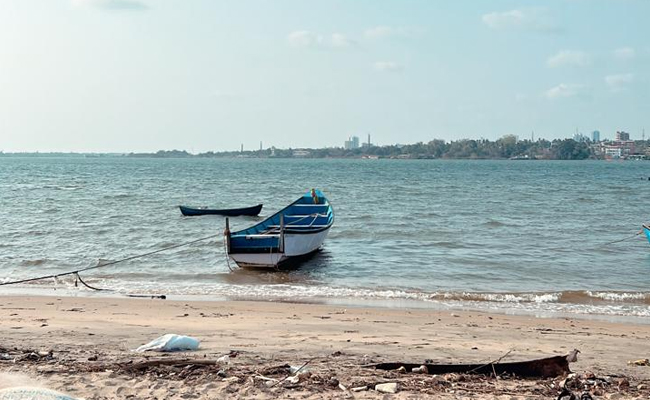Bengaluru: A recent study commissioned by the Karnataka government has revealed that 28% of the state's 328.55-km coastline is experiencing high levels of erosion. The report, submitted by the National Centre for Sustainable Coastal Management to the Environment Department, shows that the length of eroding stretches has more than doubled, from 43.7 km in 1990 to 91.6 km in 2024.
Titled Shoreline Management Plan Along Karnataka Coast, the report highlights the impact of increased sediment barriers and upstream activities on coastal erosion. It also calls for the adoption of nature-based solutions to counter the effects of climate change and human activities.
District-wise findings
The coastline of Uttara Kannada, Udupi, and Dakshina Kannada spans 328.55 km, with varying levels of erosion across the districts:
Uttara Kannada: Although 28% of its 193-km coastline is eroded, the district accounts for 39% of the state’s total erosion due to increased coastal development.
Udupi: Despite 43% of the coastline being protected by seawalls, 38% remains affected by erosion, contributing to 32% of Karnataka's overall erosion.
Dakshina Kannada: The district’s 37-km coastline faces “critical” erosion, with 39% of its stretches severely impacted, including areas such as Uchil and Batapady.
The report warns that coastal erosion threatens habitations, estuarine environments, mangroves, mudflats, and fish landing areas.
Recommendations
Identifying 44 critical erosion zones, the report suggests:
1. Beach nourishment through sand replenishment.
2. Rehabilitation of sand dunes and bioshields.
3. Mangrove afforestation to stabilise coastlines and support fisheries.
The findings will inform the Karnataka-Strengthening Coastal Resilience and the Economy (K-SHORE) project, which prioritises nature-based solutions over hard approaches like seawalls. R Gokul, Additional Principal Chief Conservator of Forests, stated that the Rs 840-crore project will focus on mangrove planting, beach nourishment, and tackling plastic pollution. These measures aim to protect the coastline and boost the blue economy.
The report will also guide the Karnataka State Coastal Zone Management Authority in reviewing coastal development proposals.
Let the Truth be known. If you read VB and like VB, please be a VB Supporter and Help us deliver the Truth to one and all.
Jabalpur (PTI): Tension gripped Sihora town in Madhya Pradesh's Jabalpur district after a clash between Hindu and Muslim groups led to stone-pelting and vandalism, prompting police to lob teargas shells, officials said on Friday. They said 49 people had been arrested so far and efforts are on to nab others involved in the unrest.
The violence erupted around 10 PM on Thursday near Azad Chowk, an area where a Durga temple and a mosque are located in close proximity.
While officials stated the situation is now under control and no injuries were reported, a heavy police presence remains on the ground, and most local shops remained closed on Friday.
Hindu organisations alleged that some miscreants broke the iron gate of the temple while an 'aarti' was being performed and also hurled stones while local Muslim residents said the clash erupted when the special Ramzan prayer and temple aarti were taking place simultaneously.
Superintendent of Police Sampat Upadhyay said that after initial attempts to use "mild force" failed to disperse the crowd, police had to resort to firing eight to ten teargas shells to disperse the unruly mob.
"We are currently not allowing people to roam in the affected area unnecessarily and are using drones to monitor the situation," Upadhyay said.
Additional SP Suryakant Sharma confirmed that 49 people have been arrested so far, with more suspects expected to be identified within 24 hours.
District Collector Raghavendra Singh denied reports that stones were hurled at the temple, as claimed by some Hindu activists and told PTI that "stone-pelting occurred between two groups, leading to the violence, and the situation is currently under control. Curfew will not be imposed."
However, Youth Welfare Minister Vishwas Sarang, speaking from Bhopal, pointed to viral social media footage and said "how stones were collected at the mosque is a matter of investigation. No one has the right to take the law into their own hands."
Deputy Chief Minister Rajendra Shukla said directives have been issued to ensure maintenance of law and order.
Several videos of the clash went viral on social media.
On Friday afternoon, Hindu activists staged a protest outside the Sihora police station, reciting the Hanuman Chalisa and submitting a memorandum demanding the demolition of the houses belonging to those involved in the violence.
Strict action will be taken against those who disrupt law and order, and efforts are being made to maintain harmony by communicating with senior members of both the communities, said SP Upadhyay.
Speaking about how the violence started, local Muslim resident Shabreen told PTI Videos, "Taraweeh prayer was being held at the mosque, and aarti was being performed at the same time. It led to the fight."
Members of the Muslim community had requested that aarti be avoided during Taraweeh prayers, but the situation escalated, she added.
Taraweeh is a special prayer recited during the month of Ramzan.
In a memorandum submitted to the police, Hindu activists accused members of the other group of indulging in vandalism at the temple.
Bajrang Dal district coordinator Kanha Pandey told PTI Videos that this type of stone-pelting incident occurred for the first time in Sihora's history, and its "real masterminds" were different.
Local councillor Arshad Khan termed the clash deplorable.
Some of those arrested were innocent, he said. "Innocent persons should be let off, and those involved in violence must be punished," he added.





